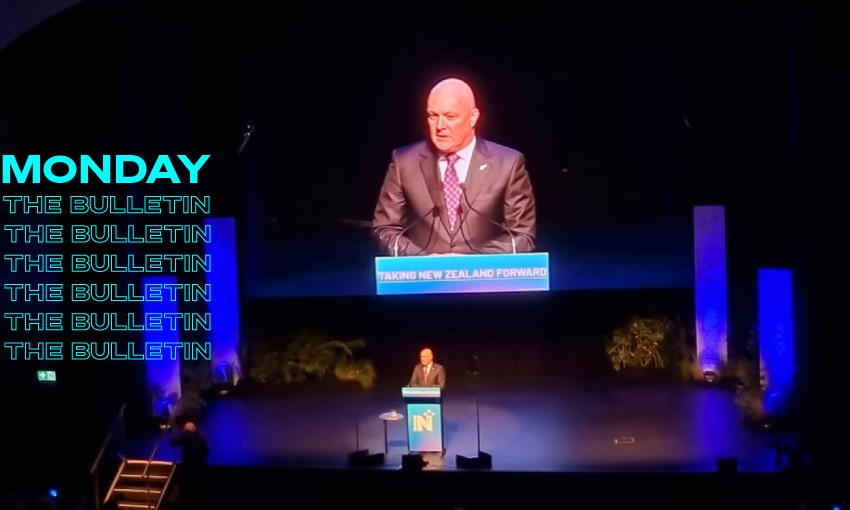New welfare policy unveiled at National Party conference
As the party looks to leave the last couple of years behind, its conference this year went off without any controversy and a new policy aimed at reducing numbers on the jobseeker benefit was announced
Mōrena and welcome to The Bulletin for Monday, August 8, by Anna Rawhiti-Connell. Presented in partnership with Z Energy.
In today’s edition: shortage of candidates for local government elections; a third of those enrolled in polytechs quit after 12 months; history made in Birmingham; but first, National Party conference “a new leaf” ahead of poll results out today.
National party leader Christopher Luxon delivers his first speech at a National Party annual conference (Photo: RNZ/ Jane Patterson)
A dull conference that delivered
The headline for last year’s Bulletin about the National Party conference read “National’s divisions revealed at conference”. Three storylines played out last year that inspired it: concerns about Todd Muller, the young Nats and their stand on conversion therapy and Sir David Carter resigning form the board. No such headlines this year, even after a ropey couple of days of tax policy confusion last week. The Herald’s Thomas Coughlan (paywalled) has some good reporting from the breakout sessions where discussion sounded robust, particularly from the environment wing of the party. But that’s about as lively as it got. Writing for The Spinoff this morning, Liam Hehir says “An exciting or even interesting conference is not something a political party should generally wish for” and on that level, the conference was a success.
Sticks and carrots for under 25s on jobseeker benefit
Luxon’s speech on Sunday was also accompanied by a welfare policy announcement. As RNZ’s Jane Patterson reports, National would take funds from the Ministry of Social Development and contract community providers as job coaches for those under the age of 25 who have been on the jobseeker benefit for more than three months. There would also be sanctions for those that don’t stick to an agreed plan and a bonus payment of $1000 to those who’ve been on the benefit for 12 months or longer, then stay in work and off a benefit for 12 months. Luxon said he was willing to make MSD staff redundant, if required, to fund the community providers.
A new leaf after years of instability
Wrapping the conference up, Thomas Coughlan writes (paywalled) that members would “be relieved” to find the headlines that appeared yesterday morning about the All Blacks being in disarray weren’t about the party. Newsroom’s Sam Sachdeva said that Luxon’s speech, and many others, “were heavily laden with the sort of red-meat remarks which help gee up a party’s base”. Stuff’s Luke Malpass writes that the conference was a “new leaf for National after the years of instability”. Malpass described the welfare policy as similar to the brand of “compassionate conservatism” we saw in the 2000s from other western democracies. “It is clearly something Luxon is genuinely, and personally, concerned about. It may not be the best politics, but it is important to him and the story he is trying to tell.”
New poll result out this morning
The results of the latest 1News Kantar poll are being released throughout the day today, with the first headline out already. 49% of New Zealanders believe the economy will worsen in the next 12 months, a figure that has been relatively stable over the past four months. Full results, including party and preferred prime minister polling, will land at 6pm. The most recent poll we’ve had is from Roy Morgan, which pundits usually advise taking with a grain of salt. It revealed a fall in support for National from 39% to 35% and a half point increase to 34% for Labour, with Te Pāti Māori holding the balance of power.
Credit card spending in the last three months has rebounded. But the gap between nominal and real spend is widening, and the slower rise in New Zealanders’ actual spending suggests they are tightening their purse strings. The effects of inflation – now at a 32-year high of 7.3% – shone through in the June quarter, confirming assumptions about how the economy is changing. In a new column on The Spinoff, Kiwibank economist Mary Jo Vergara explains what’s going on.
Shortage of council candidates to stand in local government elections
Deadlines to stand as a candidate in October’s local government elections close this coming Friday. There have been a few stories lately about a shortage of people putting up their hands to stand across the country. As RNZ reports, many councils were still without the bare minimum of candidates needed to fill their vacancies. Otago Regional Council only has two candidates for the six seats of its Dunedin constituency and five for all 12 seats. This feature for Critic Te Arohi from Elliot Weir points to some strife at the ORC. In Timaru, no one has raised their hand to run for mayor yet. In Bluff, only one person is listed as running for their community board.
One-third of first year polytech students quit their studies last year
As Stuff’s Lee Kenny reports, figures released under the Official Information Act show that one-third of first year polytech students quit their studies last year and some qualifications were unable to retain any learners at all. The data underscores the challenge ahead for Te Pūkenga, where falling enrolments have been cited as one of the reasons for its forecast $110m deficit. The 15 polytechs that make up Te Pūkenga offered a total of 227 qualifications last year, but on 51 courses, at least half of all students quit. Last Thursday, Politik’s Richard Harman wrote (paywalled) that Te Pūkenga, is one of the government’s big delivery embarrassments.
Why support The Spinoff? Here's what one of our members had to say…
“I support the Spinoff so that others who may not be able to afford membership can still have access to quality journalism - I really appreciate that The Spinoff remains paywall-free.”
- Ben Henderson, Auckland
If like Ben, you value our work and want to help keep it freely available for all, show your support by making a contribution today.
Click and collect
Almost 100 earthquake-prone hospital buildings across the country (paywalled).
The Detail looks at the upcoming national firefighters strike.
World-first study involving body cameras shows extent of child poverty in New Zealand through a child’s eye.
Police facing enforcement action from the privacy commissioner for breaches in relation to photographing people.
Instant coffee could be staging a cool comeback.
Got some feedback about The Bulletin, or anything in the news? Get in touch with me at thebulletin@thespinoff.co.nz.
If you liked what you read today, share The Bulletin with friends, family and colleagues.
Justin Lester explains how property prices have fired the rise of New Zealand’s middle-class millionaires; Toby Manhire imagines the week in politics as seen through the lens of Shortland Street; Jackie Lee Morrison tells the gruesome story of how she had 27 extra teeth removed from her mouth; and Hayden Donnell watches as Auckland councillors vote to stop housing being built where it’s needed most.
History made at Birmingham this morning
It’s official. The Birmingham Commonwealth Games have been the most successful games for New Zealand in the history of the Games. Cyclist Aaron Gate won his fourth gold medal in the men’s road race taking the gold medal tally to 18. We won 17 in 1990 in Auckland. Icing that cake were squash players Joelle King and Paul Coll who have just won gold in the mixed doubles squash final taking the total to 19.
In other sport news, about 50% of the most read stories across our main news sites yesterday were about the All Black’s loss to South Africa on Sunday, so I am going to hazard a guess and say most of you are caught up on that. I’ll probably have to set my passport on fire for saying this but I agree with Stuff’s Keith Lynch, who bravely suggests that more All Blacks losses would be a good thing. Worth a read.
And finally, the Herald’s Chris Rattue remembers long-time New Zealand sports writer David Leggat, who died while away with his family in Europe over the weekend.
“In the great halls of Costco, two of our greatest fears are assuaged”
More news (paywalled) about what the Costco store in Auckland will look like was published over the weekend. I really enjoyed this essay from American writer Yuxi Lin about the “Americanness” of the store and the role it plays in the life of her parents who immigrated to the US from China.
“Well, what’s the point of going all the way to Spain when you can have perfectly good jamón right from Costco?”










